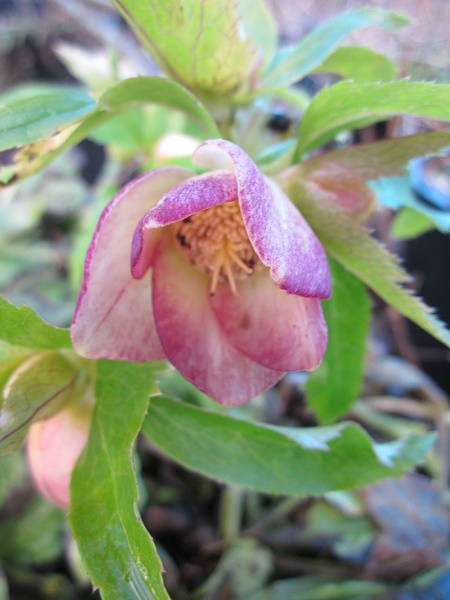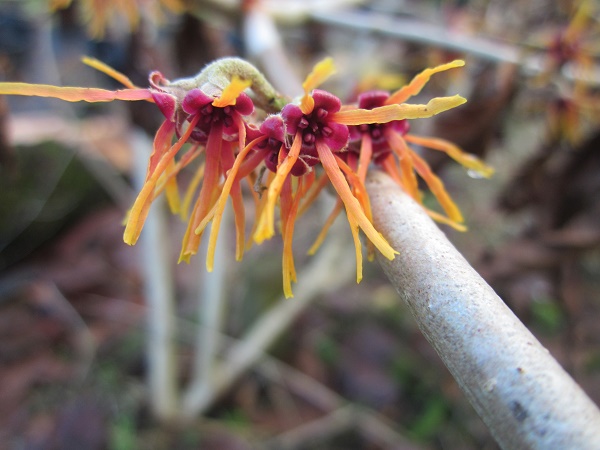JEARRARD'S HERBAL
Thats enough introduction - on with the plants!
To navigate this site, use the links above, or the detailed links at the bottom of this page.
... out in the garden.

12th January 2014
Viola riviniana
Another week to celebrate the weather. The garden is still wet and the trees are still rattling but it isn't freezing at night, which is delightful in the middle of January.
When the sun comes out it is dazzling. Perhaps it is the low angle of the light shining straight into my eyes, or maybe it is reflecting from all the wet surfaces,
but the sun has become all-enveloping. The evenings are drawing out noticeably and the garden is full of spring.
It is also full of springs. I garden on a slope that becomes steeper every year. I'm certain it must be the underlying rock tilting slowly and nothing to do with
age. A couple of feet down I hit impermeable granite so through the winter I have an underground flow of water trickling down the hill. After extreme weather events it
can't be relied on to stay underground.
The largest spring bubbles up in the middle of the Agave House, which is built on a terrace dug into the hillside. At it's deepest point the water flows out of the ground in a steady trickle.
The Agave house is supposed to be dry in winter but it is an easy problem to deal with. I just pretend it isn't happening.
That is also my solution with Viola riviniana, which romps enthusiastically through the evergreen Epimedium. Several years work have demonstrated that it is
beyond my ability to control so I have taken to enjoying the pale lilac flowers when the chance arises. It seems to flower for most of the year, so I'm not short of opportunities.

12th January 2014
Galanthus 'Richard Ayres'
Snowdrops continue to expose their varied charms to the elements. The earliest are all in flower or bud, some of the latest have still to push through the ground.
It is a worrying time and I did some anxious peering at bare patches of soil yesterday but it is pointless. Snowdrops are reliable, and they will appear in due course.
'Richard Ayres' comes from Anglesey Abbey (where he was head gardener). My fascination with the double snowdrops bubbles along below the surface.
It feels as though I should be slightly ashamed to admit to it, the dignified stoopers can be rather purist at times (always stoop, never kneel), but I like them.
'Richard Ayres' flowers early but seems to continue for a long time. The outer segments are well formed and seem to open even in cold weather, when so many
of the singles remain furled tighter than a lost umbrella. It also has a quality that I find difficult to express. It is crisper than an Iceberg lettuce. Some
of the doubles are loose and flopy and have 'wilting Cos' written all over them. Perhaps it attracts water droplets, or displays them well. It certainly
has a crisp balance of green and white, no looseness or blending. Perhaps I should just accept that I can't express it. There is something about
'Richard Ayres' that is very satisfactory.
And perhaps I like its poise and humour. Nodding head peering intently downward, stooping mischeivously back at me and giggling silently behind
its hand.

12th January 2014
Helleborus x hybridus 'Golden Sunrise'
The Hellebore border is a source of almost constant worry and wonder. The wonder springs from the magnificent nodding flowers that will start to appear
while spring is just a blind date (distant thoughts of hot times) and will continue bouncing in the bed until spring is exhausted.
The worry comes from the weeds. Hellebores do not produce enough foliage to smother them so it is a constant fight keeping them under control. In the early days of the hellebore bed
I had a high canopy of branches overhead but it didn't help. It certainly reduced the vigour of the weeds but it also slowed the hellebores
to the point of stasis. This year I mowed all the leaves off in late autumn and then used a herbicide on the weeds. The arrival of the first flowers
is a promising sign that it didn't amount to helleboricide. Time will tell if the weeds have been affected.
'Golden Sunrise' is an American seed strain. They seem to be doing much better than we are in producing stabilised strains of quality plants. This one has
variable red speckling on a pale primrose ground. It produces a very delicate and light flower in a genus that is otherwise hardwearing and practical,
like industrial knitwear.

12th January 2014
Hamamelis x intermedia 'Jelena'
My daydream for the week has involved finding a spare acre of ground somewhere and planting it with all the Hamamelis taxa I could find.
Comfortably spaced and sparkling in the spring sunshine it would ooze glee like a warm beehive ooozes the smell of honey in summer. I even bought
a lottery ticket in the hope that fate might shine as brightly on me but it wasn't to be.
I have a consolation. When I cut down the trees shading the hellebores, I replaced them with a border of Hamamelis and they are starting to progress from
sticks to shrubs. I wanted to keep the border pure but common sense kept throwing up obstacles. It is rather exposed, and an evergreen backbone of Camellias
made sense. And I needed somewhere to put some Eucryphia. And Berberis valdiviana. Rhus chinensis. Lonicera xylosteum. Magnolia grandiflora.
So, my Hamamelis border is something of a compromise.
'Jelena' is making a special effort to be orange this year, after a couple of years being pale and interesting. Unfortunatley she has also retained a lot of leaves
so the clusters of flowers are rather concealed but worth seeking out.
If I had any spaces left....perhaps I don't need quite as many Camellias.
To find particular groups of plants I grow, click on the genus name in the table above. Click on the "Index" box at the top of the page for the full list.
I have a lot of good intentions when it comes to updating this site, and I try to keep a note
about what is going on, if you are interested.
If you want to contact me, the address is infoMONKEYjohnjearrard.co.uk
When typing the address in, please replace MONKEY with the more traditional @ symbol! I apologise for the tiresome performance involved, but I am getting too much
spam from automated systems as a result of having an address on the front page.




